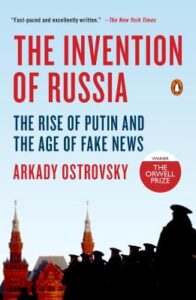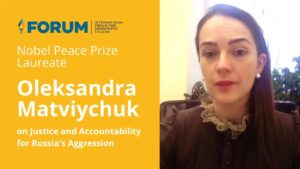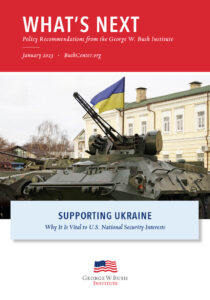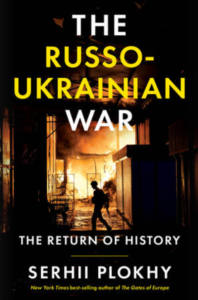Pro-democracy Russians who reject the totalitarian Putin regime are doing what they can to help Ukraine liberate all occupied territories and restore its territorial integrity. We are also planning for the day after Putin, say Garry Kasparov and Mikhail Khodorkovsky:
The Russian Action Committee, a coalition of opposition groups in exile that we co-founded in May 2022, aims to ensure that Ukraine is justly compensated for the damage caused by Putin’s aggression, that all war criminals are held accountable, and that Russia is transformed from a rogue dictatorship into a parliamentary federal republic. The looming end of Putin’s reign need not be feared, in other words; it should be welcomed with open arms.
 The end of Putin’s tyrannical rule will indeed radically change Russia (and the rest of the world), they write for Foreign Affairs. Rather than destabilizing Russia and its neighbors, a Ukrainian victory would eliminate a powerful revanchist force and boost the cause of democracy worldwide.
The end of Putin’s tyrannical rule will indeed radically change Russia (and the rest of the world), they write for Foreign Affairs. Rather than destabilizing Russia and its neighbors, a Ukrainian victory would eliminate a powerful revanchist force and boost the cause of democracy worldwide.
Putin’s war is turning Russia into a failed state, with uncontrolled borders, private military formations, a fleeing population, moral decay and the possibility of civil conflict, according to Arkady Ostrovsky, The Economist’s Russia editor. There is growing concern about Russia’s own ability to survive the war. It could become ungovernable and descend into chaos. Consider its borders, he writes:
Russia’s absurd and illegal annexation of four regions of Ukraine—Kherson, Donetsk, Luhansk and Zaporizhia—before it could even establish full control over them, makes it a state with illegitimate territories and a fluid frontier. “The Russian Federation as we know it is self-liquidating and passing into a failed-state phase,” says Ekaterina Schulmann, a political scientist. Its administration, she notes, is unable to carry out its basic functions. The annexation will not deter Ukrainian forces, but it will create precedents for Russia’s own restive regions, including the north Caucasus republics, which are likely to head for the exit if the central government starts loosening its grip.
 “I have been working in the field of human rights protection for twenty years and documenting war crimes for eight years. But, to be honest, I wasn’t ready for the amount of cruelty we’ve encountered. And it seems to me that nobody can be ready for this,” said Oleksandra Matviichuk, Nobel Peace Prize Laureate 2022 and head of Ukraine’s Center for Civil Liberties.
“I have been working in the field of human rights protection for twenty years and documenting war crimes for eight years. But, to be honest, I wasn’t ready for the amount of cruelty we’ve encountered. And it seems to me that nobody can be ready for this,” said Oleksandra Matviichuk, Nobel Peace Prize Laureate 2022 and head of Ukraine’s Center for Civil Liberties.
“In reality, freedom is not a given. We make choices every day. And the values of modern civilization must be protected,” she told the World Economic Forum at Davos.
“Victory for Ukraine is succeeding in democratic transformation and building a sustainable democratic institution,” said Matviichuk, a recipient of the National Endowment for Democracy’s 2022 Award. “Success of Ukraine will have a huge impact to a democratic future of Russia itself and to other countries in our regions where the freedom shrinks to the space of a prison cell.”
Total, bipartisan solidarity
 “Nothing should be off the table” in terms of security assistance to Ukraine, says the World Liberty Congress, the largest gathering of dissidents from over 40 countries.* It calls on the Ukraine Defense Contact Group, aka the “Ramstein Group meeting,” to ensure that Ukrainians have the weapons they need to protect civilians and repel the Russian aggressor.
“Nothing should be off the table” in terms of security assistance to Ukraine, says the World Liberty Congress, the largest gathering of dissidents from over 40 countries.* It calls on the Ukraine Defense Contact Group, aka the “Ramstein Group meeting,” to ensure that Ukrainians have the weapons they need to protect civilians and repel the Russian aggressor.
It’s vital that the United States show total, bipartisan solidarity with Ukraine and any other country which might be threatened by thuggish, authoritarian regimes, the Bush Center’s David J. Kramer writes in a new report:
- The United States and its allies must increase military support for Ukraine to help it achieve victory over Russia.
- The U.S. administration and its European counterparts must maintain, even tighten, the sanctions on the Putin regime to deter further aggressive behavior and go after corrupt Russian funds.
- International lending agencies, together with individual countries, should prepare for massive financial assistance for Ukraine, much of which could be funded by seizing those Russian assets overseas.
- Democratic nations should hold Russia accountable for the invasion of Ukraine and other war crimes and signal to authoritarian regimes like the one in China that similar acts won’t be tolerated.
Without Ukraine’s grain, over 400 million people will go hungry. So every country must support #Ukraine because in the process we are supporting people around the world, @WCKitchen founder @chefjoseandres told @wef. #UkraineRussiaWar https://t.co/KSql2RzlYQ via @wef
— Democracy Digest (@demdigest) January 20, 2023
Now Ukraine has shouldered this burden on behalf of other, equally menaced democracies. We owe this extraordinary country a huge amount, says Linas Linkevičius, Lithuania’s former Foreign Minister and a member of CEPA’s International Leadership Council. When this war is won, and assuming it still wants to, Ukraine must immediately be accepted into NATO. EU accession negotiations must begin this year, he writes.
 In a new international environment defined by the proliferation of nuclear weapons, the disintegration of the post–Cold War international order, and a resurgence of populist nationalism, Ukraine is now more than ever the most volatile fault line between authoritarianism and democratic Europe, Harvard’s Serhii Plokhy writes in his forthcoming book, The Russo-Ukrainian War: The Return of History.
In a new international environment defined by the proliferation of nuclear weapons, the disintegration of the post–Cold War international order, and a resurgence of populist nationalism, Ukraine is now more than ever the most volatile fault line between authoritarianism and democratic Europe, Harvard’s Serhii Plokhy writes in his forthcoming book, The Russo-Ukrainian War: The Return of History.
Whether [Putin] succeeds, or whether the flow of body bags, coupled with the discontent of the elite, results in his downfall, will determine how many more people will die and how far Russia falls, The Economist’s Ostrovsky adds.
As Alexei Navalny, Russia’s jailed opposition leader, said in one of his court hearings: “We have not been able to prevent the catastrophe and we are no longer sliding, but flying into it. The only question will be how hard Russia will hit that bottom and whether it will fall apart.”
It’s time to West step up and act for the future. Ukraine is bleeding. Father and son Oleksandr and Mykhailo Kutsyk – served together and died Jan 16, 2023.
Not giving weapons to🇺🇦 means share responsibility for growing numbers of killed defenders due to lack of tanks, F16,ATACMs pic.twitter.com/eM2rNKNYTO— Hanna Hopko (@HopkoHanna) January 20, 2023
*The World Liberty Congress Leadership Council
Oleksandra Matviichuk (Ukraine)
Garry Kasparov (Russia)
Masih Alinejad (Iran)
Joey Siu (Hong Kong)
Wai Hnin Pwint Thon (Burma)
Wu’er Kaixi (China)
Chemi Lhamo (Tibet)
Nury Turkel (East Turkistan/Xinjiang)
Sunny Cheung (Hong Kong)
Theary Seng (Cambodia)
Mardi Seng (Cambodia)
Felix Agbor Nkongho Balla (Cameroon)
Maximilienne Ngo Mbe (Cameroon)
Gladys Hlatywayo (Zimbabwe)
Beni Carbone (Democratic Republic of Congo)
Carine Kanimba (Rwanda)
Diing Deng Mou Aguer (South Sudan)
Peter Biar Ajak (South Sudan)
Evan Mawarire (Zimbabwe)
Succes Masra (Chad)
Andréi Sánnikov (Belarus)
Ivan Tyutrin (Russia)
Jhanisse Vaca-Daza (Bolivia)
Carolina Barrero (Cuba)
Leopoldo López (Venezuela)
Rosalia Miller (Nicaragua)
Faisal Al-Mutar (Iraq)
Fadi Elsalameen (Palestine)
Sardar Pashaei (Iran)
Roya Mahboob (Afghanistan)
Ammar Abdulhamid (Syria)







